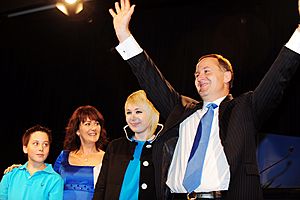John Key facts for kids
Quick facts for kids
Sir John Key
GNZM AC
|
|
|---|---|
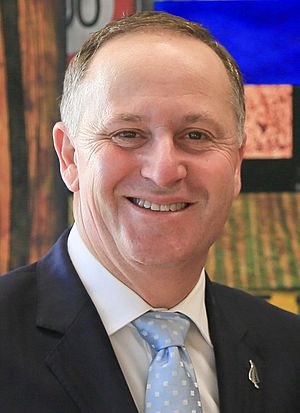
Key in 2015
|
|
| 38th Prime Minister of New Zealand | |
| In office 19 November 2008 – 12 December 2016 |
|
| Monarch | Elizabeth II |
| Governor-General | Anand Satyanand Jerry Mateparae Patsy Reddy |
| Deputy | Bill English |
| Preceded by | Helen Clark |
| Succeeded by | Bill English |
| 31st Leader of the Opposition | |
| In office 27 November 2006 – 19 November 2008 |
|
| Deputy | Bill English |
| Preceded by | Don Brash |
| Succeeded by | Phil Goff |
| 11th Leader of the National Party | |
| In office 27 November 2006 – 12 December 2016 |
|
| Deputy | Bill English |
| Preceded by | Don Brash |
| Succeeded by | Bill English |
| Chairman of the International Democracy Union | |
| In office 21 November 2014 – 21 February 2018 |
|
| Deputy | Tony Clement |
| Preceded by | John Howard |
| Succeeded by | Stephen Harper |
| Member of the New Zealand Parliament for Helensville |
|
| In office 27 July 2002 – 14 April 2017 |
|
| Preceded by | Constituency established |
| Succeeded by | Chris Penk |
| Majority | 20,547 (56.49%) |
| Personal details | |
| Born |
John Phillip Key
9 August 1961 Auckland, New Zealand |
| Political party | National |
| Spouse |
Bronagh Dougan
(m. 1984) |
| Children | Max Key and one daughter |
| Parents |
|
| Alma mater | University of Canterbury (BCom) |
| Signature |  |
Sir John Phillip Key (born 9 August 1961) is a retired New Zealand politician. He was the 38th prime minister of New Zealand from 2008 to 2016. He also led the National Party during that time.
Key grew up in Christchurch in a state house with his mother after his father died. He went to the University of Canterbury and earned a degree in commerce. He started a career working with money and different currencies in New Zealand. Later, he moved overseas to work for the company Merrill Lynch. There, he became the head of global foreign exchange.
In 2002, Key entered politics and was elected to the New Zealand Parliament. By 2006, he became the leader of the National Party. After two years as Leader of the Opposition, he led his party to victory in the 2008 election.
Key served three terms as prime minister. His government dealt with the global financial crisis and the 2011 Christchurch earthquake. In a surprise move, Key resigned in December 2016, saying he wanted to spend more time with his family. After leaving politics, he joined the boards of several large companies.
Contents
Early Life and Education
John Key was born in Auckland on 9 August 1961. His father, George, was an English immigrant. His mother, Ruth, was an Austrian-Jewish refugee. When Key was eight, his father died of a heart attack. His mother raised him and his two sisters in a state house in Christchurch.
Key attended Burnside High School, where he met his future wife, Bronagh. He then studied at the University of Canterbury, graduating with a Bachelor of Commerce degree in 1981. He also took business courses at Harvard University in the United States.
Career Before Politics
Key's first job was as an auditor. He then worked for a clothing company before becoming a foreign exchange dealer. This job involved trading money from different countries. He was very successful and quickly moved up in his career.
In 1995, he joined Merrill Lynch, a major American investment company. He became their global head of foreign exchange, based in London. Some colleagues called him "the smiling assassin" because he stayed cheerful even when making difficult decisions that affected people's jobs. In 1999, he was chosen to be a member of a committee at the Federal Reserve Bank of New York.
Political Career
Entering Parliament
The National Party encouraged Key to enter politics. In the 2002 election, he won the seat for the Helensville electorate in Auckland. This was a tough election for the National Party, which had its worst result ever.
Because the party had few Members of Parliament, Key was given important roles quickly. In 2004, he became the party's finance spokesman. He debated against Michael Cullen, who was the government's experienced Minister of Finance.
Leader of the Opposition
In 2006, Don Brash resigned as leader of the National Party. Key was elected as the new leader without any opposition. He became the Leader of the Opposition, which is the leader of the largest party not in government.
As leader, Key spoke about helping people who were struggling in New Zealand. He promised to provide food in the country's poorest schools. He also changed the party's position on some issues, such as supporting interest-free student loans.
Prime Minister (2008–2016)
Key became Prime Minister after the National Party won the 2008 general election. National formed a government with support from the ACT, United Future, and Māori parties.
First Term: 2008–2011
Key's first term began during a global economic downturn. His government lowered income taxes but raised the Goods and Services Tax (GST) from 12.5% to 15%. This was a tax on things people buy. The government also took steps to save money, which included cutting funding for some TV channels.
In February 2011, a powerful earthquake hit Christchurch, causing massive damage and killing 185 people. Key called it "New Zealand's darkest day." His government set up the Canterbury Earthquake Recovery Authority (CERA) to lead the rebuilding effort.
In foreign policy, Key worked to build a stronger relationship with the United States. In 2010, the two countries signed the Wellington Declaration, promising to work together on global issues.
Second Term: 2011–2014
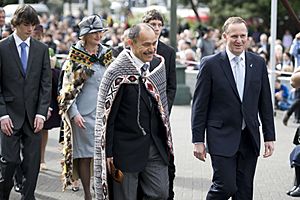
National won the 2011 election, and Key began his second term. During this time, his government sold minority shares in five state-owned companies, including power companies. This policy was known as partial privatisation.
In 2012, it was revealed that the Government Communications Security Bureau (GCSB) had illegally spied on internet entrepreneur Kim Dotcom. As the minister responsible for the GCSB, Key apologised to Dotcom and to the public.
Third Term: 2014–2016
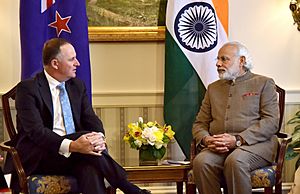
After winning the 2014 election, Key started his third term. A major focus was the debate over New Zealand's flag. Key supported changing the flag and held two referendums. In the end, New Zealanders voted to keep the existing flag.
Another major issue was the rising cost of housing, especially in Auckland. Critics said the government did not do enough to solve the problem.
Key was a strong supporter of the Trans-Pacific Partnership (TPP), a large trade agreement between 12 countries. He believed it would be good for New Zealand's economy. The agreement was signed in Auckland in 2016.
On 5 December 2016, Key announced his resignation as Prime Minister. He said he had given everything to the job and it was the right time to leave. He was succeeded by his deputy, Bill English.
Life After Politics
After resigning, Key left Parliament in April 2017. He has since taken on roles in the business world. In 2017, he joined the board of directors for Air New Zealand and became chairman of ANZ Bank New Zealand. He is also on the board of an American cybersecurity company.
Key has continued to share his opinions on politics. He has spoken about the government's response to COVID-19, Māori issues, and foreign policy.
Political and Social Views
- Economy: Key supported lower taxes and selling parts of state-owned companies. He believed these policies would help the economy grow.
- Social Issues: Key had mixed views on social issues. He voted against civil unions in 2004 but later voted in favour of same-sex marriage in 2013.
- Monarchy: Key said he was a monarchist and supported keeping the Queen as New Zealand's head of state. In 2009, his government brought back titles like Sir and Dame.
- Climate Change: Key stated that global warming was real and that the government needed to act to reduce emissions.
Personal Life
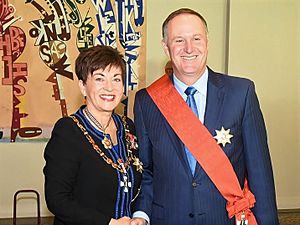
Key married his high school sweetheart, Bronagh, in 1984. They have two children, a daughter named Stephie and a son named Max Key.
Key is one of New Zealand's wealthiest prime ministers, with an estimated wealth of over NZ$50 million. He is an agnostic, meaning he is unsure if God exists. In his spare time, he enjoys golf and learned to fly a helicopter.
In 2017, Key was made a Knight Grand Companion of the New Zealand Order of Merit for his service to the country. He is now known as Sir John Key.
See also
 In Spanish: John Key para niños
In Spanish: John Key para niños
- Electoral history of John Key
- List of New Zealand ministries
- Contents of the United States diplomatic cables leak (New Zealand)
Images for kids
-
U.S. Secretary of State John Kerry meets Key at Premier House, 2016.
-
Key with his predecessor, Helen Clark.
 | Dorothy Vaughan |
 | Charles Henry Turner |
 | Hildrus Poindexter |
 | Henry Cecil McBay |


